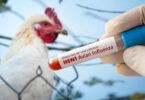Barron’s published a detailed report last week titled “A Golden Age of Vaccines Is Here. What It Means for You.” The report explains how some of the leading pharmaceutical companies are seeking to rake in new revenue streams with new vaccines, such as ones with mRNA technology among others, to treat a myriad of other ailments, after these titans experienced record profits from the last several years from manufacturing Covid-19 vaccines.
The following are excerpts from that report:
Roll up your sleeves. Effective new vaccines have hit the market for everything from pneumonia to shingles to RSV to, of course, Covid-19. And that’s just the beginning.
There were 258 vaccines in development as of 2020, according to a report from trade group Pharmaceutical Research and Manufacturers of America, or PhRMA. It found that $406 billion in direct medical costs were saved due to routine childhood vaccination of U.S. children born from 1994 to 2018.
Pharmaceutical companies are currently developing everything from personalized cancer vaccines that could cost tens of thousands per patient to vaccines that prevent developing-world diseases like malaria or tuberculosis. Improved flu, pneumonia, and meningitis vaccines will also be available in your neighborhood pharmacy.
Scientists are testing vaccines to prevent a virus believed to cause multiple sclerosis in some people. Someday, vaccines could routinely treat acne, protect against peanut allergies, and even prevent heart disease or help treat Alzheimer’s disease.
Last year, Moderna and Merck conducted a trial in which personalized vaccines that used genetic sequencing to target specific mutations in each patient’s cancer helped slash the recurrence rate for metastatic melanoma. The two pharmaceutical companies plan to try the same approach on lung cancer and other carcinomas.
“One of the most powerful things in human health is the immune system,” says Moderna President Stephen Hoge, himself a physician. “We now understand cancer as a disease that emerges later in life principally, not because of mutations but because the immune system gets less effective in controlling it.”
[…] Vaccines, by contrast, use the body’s own immunological response to fight off disease. They tend to have fewer long-term side effects than drugs, despite the recent surge in vaccine hesitancy in the American public.“Why are vaccines better than drugs? Vaccines prevent things from ever happening so you never have to treat them,” says Kawsar Talaat, an infectious disease physician and vaccine scientist at Johns Hopkins.
Pharmaceutical companies didn’t prioritize vaccines because they tend to be less profitable than medicines that must be taken every day for years, Talaat says. “It has changed quite a bit in the past few years.” Since Talaat completed her residency at the Medical College of Wisconsin in 2001, she says she has seen drops in patients with certain types of pneumonia, rotavirus, and shingles because of vaccines.
Drug companies are spending big on vaccine development. New technologies have made it possible for them to develop effective vaccines more quickly and cheaply than in the past. When the Covid pandemic hit, drug companies were able to deliver effective vaccines to the public in roughly a year—a fraction of the time that vaccines typically take. Pfizer and partner BioNTech (BNTX) and Moderna received tens of billions of dollars in revenue selling their Covid vaccines.
But the end of the pandemic also underscored the business challenge that vaccines pose for drug companies. Sales of Covid booster shots have cratered this year, and Moderna—whose Covid vaccine is its only approved product—is scrambling to get new products on the market. It hopes to have a respiratory syncytial virus, or RSV, vaccine approved by the spring of 2024, followed by a flu vaccine, and then a combination Covid-flu-RSV shot in 2025.
“Our vision is to combine the viruses that drive flulike symptoms into a single dose so you don’t need to worry which virus you get the booster for, whether it’s Covid, RSV, or flu,” says Moderna CEO Stéphane Bancel. He says that respiratory diseases are the No. 3 or No. 4 killer in most countries, and that a combo shot could prevent most of them.
Pfizer, meanwhile, is working on its own combination respiratory virus vaccine and is training its sights on infectious disease of all stripes. Anderson, the Pzifer vaccine R&D chief, points to the development of a vaccine for pregnant women for Group B strep bacteria. The bacteria isn’t usually dangerous for women but can be transmitted during birth and can lead to sepsis, pneumonia, meningitis, or seizures for babies. She says this strep is particularly problematic in less-developed countries and communities in the U.S. where pregnant woman get less prenatal screening.
While Moderna represents a concentrated bet on vaccines, Pfizer, GSK (GSK), and Sanofi (SNY)—leading vaccine makers in the U.S.—are huge, diversified companies selling an array of products. They all see vaccine development as a key area of business over the coming years.
Sanofi, a leader in selling flu shots, has a stated goal of doubling vaccine sales and becoming the industry leader in immunology by 2030, hitting 10 billion euros ($10.84 billion) in annual vaccine sales. Sanofi says it will have three to five major vaccines in final-stage trials by 2025, including an RSV toddler vaccine, a pediatric pneumonia vaccine, and an improved yellow fever vaccine.
GSK sells the only shingles vaccine available in the U.S. It is improving its pneumonia vaccines and herpes vaccines so they treat more strains. Phil Dormitzer, GSK’s global head of vaccine R&D, notes that his company is doing early-stage research on a vaccine for gonorrhea, which is a growing health problem because of antibiotic-resistant strains of the venereal disease. “It used to be relatively easy to treat. Now, there are more drug-resistant strains to treat,” he says.
Researchers also are developing nontraditional vaccines. Pfizer, partnering with vaccine specialist Valneva (VALN), and Moderna are testing Lyme disease vaccines. Sanofi is developing one that combats the bacteria that causes acne skin disruptions.
The Food and Drug Administration recently gave fast-track status to a vaccine to treat the effects of Alzheimer’s disease. Instead of fending off a pathogen, vaccines could be used to make the body more tolerant of allergens like peanuts, scientists say. Meanwhile, a heart-disease vaccine would cause the body to produce less cholesterol. All of these vaccines are being researched.
And earlier this year, the government announced a $5 billion effort, dubbed Project NextGen, to develop new and better Covid vaccines. Among other things, the project will attempt to develop nasal vaccines that could better protect against infection, and is targeting vaccines that could work on a variety of coronavirus diseases.
The biggest challenge facing vaccines is no longer the science but the growing number of Americans that refuse to take them.
Vaccine hesitancy has been a growing issue for years. It exploded during the pandemic, when thousands of Americans quit jobs rather than receive a Covid vaccination. While 92% of American adults have received at least one Covid vaccination shot , according to the Centers for Disease Control and Prevention, only about 21% got the booster shot being given earlier this year, and roughly 14% have received the current booster.
“You have the meteoric rise of science for developing and producing vaccines at the same time you have increasing skepticism and rejection of vaccines,” says Dr. Gregory Poland, who heads a vaccine team at the Mayo Clinic.
[…] Pharmaceutical companies are trying to make their vaccines more palatable to the American public. A lot of people dread needles, so drug companies are developing more vaccines that can be taken through a skin patch or a nasal spray.If rising numbers of Americans refuse to take vaccines, it could ultimately crimp vaccine development, says Poland. “If they won’t take them in our society where our vaccines are produced by for-profit manufacturers,” he says, “manufacturers aren’t going to invest the roughly $1 billion it takes to go from a concept to a marketable vaccine.”
GSK’s Dormitzer agrees that vaccine hesitancy is a growing problem but says the current number of people who don’t take vaccines isn’t “enough to discourage drug companies from coming out with new vaccines.” He notes that despite pushback against Covid vaccines, the majority of Americans were vaccinated at least once.
Growing vaccine hesitancy doesn’t seem to be impeding vaccine development, which is being juiced by new technology. The drug companies increasingly are using mRNA technology, tiny chunks of genetic material that tell the body’s cells to crank out specific proteins, such as the spike in the Covid virus, that produce an immunological response. “We can do very complex proteins because the mRNA is just a piece of software to code,” explains Moderna CEO Bancel.
Read the full article here.
AUTHOR COMMENTARY
1 Timothy 6:9 But they that will be rich fall into temptation and a snare, and into many foolish and hurtful lusts, which drown men in destruction and perdition. [10] For the love of money is the root of all evil: which while some coveted after, they have erred from the faith, and pierced themselves through with many sorrows. [20] O Timothy, keep that which is committed to thy trust, avoiding profane and vain babblings, and oppositions of science falsely so called: [21] Which some professing have erred concerning the faith. Grace be with thee. Amen.
Per usual and no surprise, it always comes down to money. Big-pharma is dying for more money, and they are looking to make major returns on investment with all these new kinds of shots they are creating – vaccines that I will most definitely not be taking, thank you very much.
Of course, when this “next pandemic” rolls out you better believe they will have vaccines ready to go much sooner next time…
Bill Gates Says ‘We’ll Have Giant MRNA Factories For The Next Pandemic’
US Pays Moderna $176 Million To Develop MRNA Bird Flu Vaccine Amidst Growing Pandemic Fears
[7] Who goeth a warfare any time at his own charges? who planteth a vineyard, and eateth not of the fruit thereof? or who feedeth a flock, and eateth not of the milk of the flock? [8] Say I these things as a man? or saith not the law the same also? [9] For it is written in the law of Moses, Thou shalt not muzzle the mouth of the ox that treadeth out the corn. Doth God take care for oxen? [10] Or saith he it altogether for our sakes? For our sakes, no doubt, this is written: that he that ploweth should plow in hope; and that he that thresheth in hope should be partaker of his hope. (1 Corinthians 9:7-10).
The WinePress needs your support! If God has laid it on your heart to want to contribute, please prayerfully consider donating to this ministry. If you cannot gift a monetary donation, then please donate your fervent prayers to keep this ministry going! Thank you and may God bless you.








In your dreams, you sorcerers!
May the fires of Hell consume big pharma!
Of course, those who are lost and willfully ignorant (keyword: WILLFULLY) step right up and get a death jab!
10 And with all deceivableness of unrighteousness in them that perish; because they received not the love of the truth, that they might be saved.
11 And for this cause God shall send them strong delusion, that they should believe a lie:
12 That they all might be damned who believed not the truth, but had pleasure in unrighteousness.
2 Thessalonians 2:10-12
I hope you did something fun after posting this article …. Their love of money is so filthy, it’s comes right through this article. YUK!
They’re just fulfilling UN Agenda 2030. Georgia Guide Stones.
And all of them have aluminum, mercury and components of HIV. Sounds yummy!
Billions & Billions & Billions for Big Pharma – That is the Cure!
Just wait until people find out that a vaccine or 2 that they may have received a few years ago now requires follow up jabs to stay alive. And Now we know that the Covid is being administered to people who believe they are getting a flu shot. People have no earthly idea what all is being done to them as these poisons are injected into their bodies.
So, COVID was a mass test. If so, I don’t want your vaccines and will quit going to the doctor.
The whole thing was a lie from start to finish. The medical establishment is a joke: they just want to make a perpetual patient out of you.
If you have a zit or two, I’m sure they’ll make a vaccine too.
(Try this in military marching cadence.)
It’s not a vaccine. It’s gene therapy, MRna.
They’re injective man-made components into your own DNA
This is the medical pharmacom industry trying to use proactive health to seed disease for future profits. If you take injections for some issue you don’t have, you will shortly have it. Think before you act!
You can definitely see your enthusiasm in the paintings you write. The world hopes for even more passionate writers such as you who aren’t afraid to say how they believe. Always go after your heart.
Hello. impressive job. I did not anticipate this. This is a excellent story. Thanks!